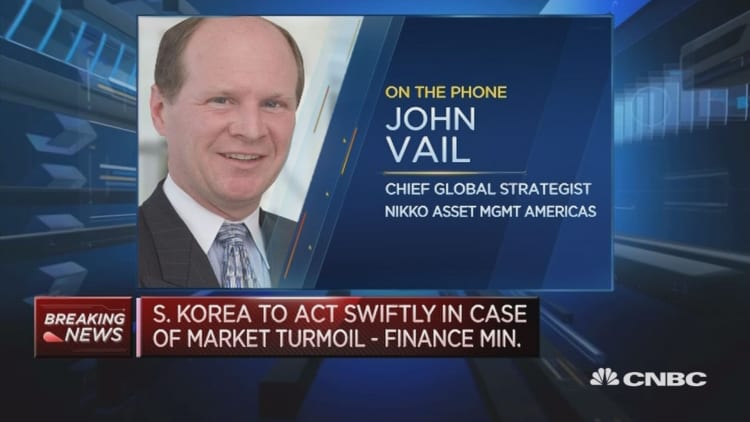Donald Trump repeatedly pledged to take an aggressive stance against North Korea on the campaign trail, but nearly a month into his presidency, he may cede control of the issue to China.
"After last week's phone call with Chinese President Xi Jinping, I suspect that his first move will be to talk to China and bring Beijing to apply pressure on North Korea," Alastair Newton, co-founder and director of Alavan Business Advisory, told CNBC on Monday.
Pyongyang claimed it successfully test-fired a medium-to-long-range ballistic missile on Sunday. Called the Pukguksong-2, the weapon was powered by solid fuel and capable of carrying a nuclear warhead, according to North Korean state media. In response, Washington, Tokyo and Seoul have requested an urgent United Nations Security Council meeting on Monday.
If Trump were to allow Beijing to take the lead on such a delicate matter, as Newton predicted, that would align with the Republican's tonal shift on the world's second-largest economy.
Hostile anti-China sentiments have marked much of Trump's presidency—in a tweet last month, he criticized Beijing for its lack of assistance on reigning in Pyongyang's military technology. But last week featured a cordial phone call with Xi, in which Trump agreed to support the "One China" policy that he previously questioned.
As North Korea's biggest trading partner and main source of aid, China holds influence over the pariah state. But bilateral ties, which date back to the Korean War, have weakened since North Korea began testing nuclear weapons in 2006 and Beijing has since joined the international community in supporting UN sanctions. Still, the West has long urged Xi's administration to rebuke more forcefully.
Trump's initial response to Sunday's missile launch was muted, with the president merely stating his support for Japan, another enemy of North Korea, during a summit with Prime Minister Shinzo Abe.

"Just a couple of weeks ago, Washington imposed additional unilateral sanctions on Iran for a similar missile test, so we have to assume that Trump will do something," Newton said.
The idea of secondary sanctions, involving punishment against Chinese banks funding Pyongyang, has been floated as a possible option but Newton doesn't believe that will materialize.
"The positive call [with Xi] means Trump is more prepared to work with China rather than lash out," he explained. "It will be interesting to see what China will do. We may be going to the UN with this issue."
Sunday's launch did not take the world by surprise—such an incident was widely anticipated based on North Korean leader Kim Jong's recent threats to test an intercontentinetal ballistic missile (ICBM). But because the weapon launched wasn't an ICBM, experts said the incident didn't provide any additional insight into the rogue nation's nuclear program.
"The launch was predictable, even inevitable," Michael Hayden, a retired U.S. Air Force general and former CIA director, told CNBC. The move was a means for Kim to re-assert his authority as Trump and Abe held talks, Hayden added.
Pyongyang is widely expected to conduct further weapons tests in the coming months. Seoul and Washington are due to hold joint military exercises at the end of the month, while North Korea will celebrate the birthday of Kim Il Sung, the nation's founder, on April 15—both annual events are typically marked by demonstrations of Pyongyang's military might.
The pariah state has conducted five nuclear tests since 2006—two of which took place last year, including an alleged hydrogen bomb trial—that sparked numerous sanctions from Western governments. The country has never successfully launched an ICBM.
—CNBC's Sri Jegarajah contributed to this report.

